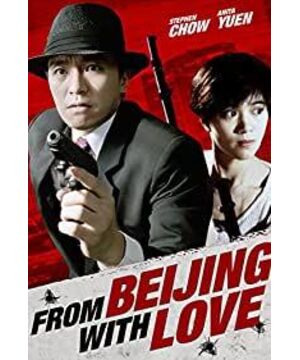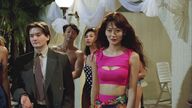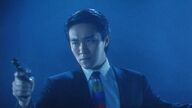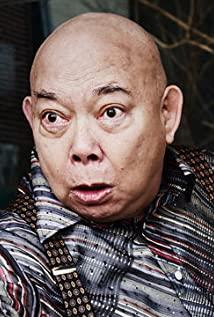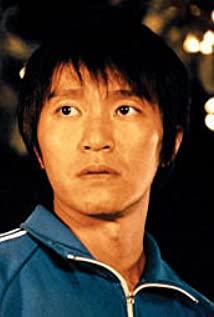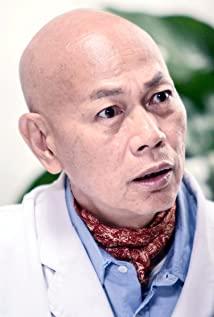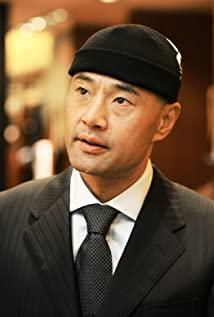Adhering to the routine of "foreign boy rushing to the end of the world", the action film directed by Zuo Songsheng, Luo Wei, Yuan Kui and others - "New Jingwumen 1991" made Zhou Xingchi's first shot in 1991. This film can be put together with 1992's "Cartoon Dragon", because they are originally the relationship between the first and the second episode. The first episode seems to be ordinary, but the second episode, because of Xiao Fangfang's addition, the texture of the whole movie has risen to a new level. .
The match between Zhou Xingchi and Xiao Fangfang is only this time. Maybe the mainland audience's impression of Xiao Fangfang is still in the "Fang Shiyu" series played by Jet Li, because Xiao Fangfang's mother played in the series is quite good, and many fans were deeply moved back then. The nephew played by Chen Baixiang and the prodigal son played by Zhong Zhentao are still full of jokes, so when talking about the movie "Cartoon Dragon", there are still many fans of the post-8090s generation who have deep memories, but they also have a lot of memories. It's just that, like 80% of Hong Kong films, this movie just stays "laughing" in the end.
As for "Love Saint", if you haven't seen George Hill's "Deception" in 1973, I believe that many people will praise the screenwriting level of this film. The presentation of the film is considered passable. , Mao Shunyun, Yuan Hua and others joined, and Zhou Xingchi's carrying the tripod, the body jokes are self-evident. However, as long as you have watched "Cheat Within Deception", the star rating of "Love Saint" will be immediately lowered by one level, because the core scams and scene settings of the two are almost the same. Under the premise of greatly reducing the originality, as long as Objective movie fans will naturally be disappointed, but what is most worth mentioning is that this film is the first movie that Stephen Chow and Li Lichi collaborated on. With this, "Love Saint" is a hard-to-understand movie on the way of Stephen Chow's film. Note it!
If the "Saint of Gamblers" series brought Zhou Xingchi the first wave of "honor", then the second wave of "brilliant" films was the "Fighting Dragon" series. Undoubtedly, "Fighting Dragon" directed by Chen Jiashang raised Zhou Xingchi's fame by another level. The screen image of "Zhou Xingchi" had a great influence on Hong Kong at that time.
Why is this series so successful? The key lies in the "hodgepodge of genre films". Anyone who knows a little about Hong Kong films will know that in the 1980s and 1990s, the most popular Hong Kong films were action films, police and bandit films, chasing girls films and comedy films. The beauty is not that it takes a certain type to the extreme, but that it touches every type, like a box of assorted candy, you always look forward to what will happen in the next chapter, just like the world of "Harry Potter" The "Bibi Weiwei Candy" in the movie has all kinds of flavors. When watching a movie, the audience is like a child. What do you think is the biggest characteristic of a child? Curiosity, the audience who is curious about everything naturally likes movies that have everything.
In "Fighting Dragon", the first girl chasing is the female teacher played by Zhang Min, and the second chasing is the female student played by Zhu Yin (actually a woman chasing a man). The stories are also about dangerous characters and The school is implicated, and the characters are also students and teachers. The "Fighting Dragon" series has made school-themed films in Hong Kong films flourishing, such as "Fucking Out of School", "Fighting Heroes", "Super School Overlord" and other films. Launched in 1992 and 1993, the basic model still continues Zhou's two films.
What's interesting is that although the first two films of "Fighting from School" are quite gratifying in terms of fame and box office, when it comes to quality, they are not as good as the third "Fighting from School, Power Dragon 3: The Year of the Rooster". The director has changed and changed. Became Wang Jing, the background changed, from the school to a rich family, the only thing that has not changed is the background of the characters related to "Zhou Xingxing", such as the dispensable girlfriend - Zhang Min.
The reason why the third part is high is because of the word "love". The first two parts only need to laugh, but there is no emotion. The third part is in the context of suspense, murder, jokes, love and other dimensions. In just 89 minutes, the story is complete and the emotions are rich, and the effort is naturally more emotional than the first two joking movies. Among them, Anita Mui's performance is indispensable. The godlike appearance of the boy and the girl, and the free performance of sending and receiving, let Zhou Xingchi no longer sing a one-man show, but have a well-matched opponent.
As for Wang Jing, who cooperated with Shimi at this stage, his screenwriting ability is quite excellent. When Fatty Wang first debuted in his early years, he sold scripts. Like Quentin, he was the cornerstone of the story. Although he is the son of director Wang Tianlin, Wang Jing does not have the air of a son. He graduated from the Chinese University of Hong Kong, and he is always very down-to-earth. The films he cooperated with Stephen Chow are also remarkable.
In 1991, "The Gambler 2: The Shanghai Gambling Saint" was their first masterpiece. The film drew on the time-travel routine of "Ancient and Modern Wars Against Qin Terracotta Warriors". It still talked about gambling, but it was very "fresh and refined". Zhou Xingchi's first cooperation was quite open. Even if the song and dance section of "Char Siu Bao" was put into today's Chinese film circle, it is still not necessarily surpassed. Today's Chinese film workers should also reflect on why twenty The singing and dancing scenes from many years ago have not been surpassed so far.
As for "The Tricky Expert" and "The Lu Ding Ji", they are typical Zhou-style films, and there is no shortage of banter. In these films, we have discovered a truth. The films starring Zhou Xingchi basically only need one. The protagonist, Andy Lau, probably knew this, so after "The Tricky Expert", he never acted in a "Double Hero Series" movie with Stephen Chow again. So we saw that "The Deer and Ding Ji" only needs one Zhou Xingchi. Although women add color, they are difficult to be eye-catching.
As for "A Happy Family" in 1992, it can only be regarded as a performance contribution by Stephen Chow. To a certain extent, it cannot be regarded as a complete Chow movie. In the same way, "Tang Bohu's Autumn Fragrance" is still touted as a classic. In fact, to be honest, like the above-mentioned films, although the director has been replaced by Li Lichi, the reason why it has attracted everyone's attention is that they "use Nonsensical performances and coherent stories, telling a legend that everyone is happy".
The "Trial of the Dead" co-produced by Zhou Shi and Du Qifeng is actually a warm-up for "Nine-Rank Sesame Official". Except for Zhou Xingchi's change from a big to a small official, the two are quite close in story, but in terms of completion, the latter is naturally more better than ever. The reason is actually very simple, because Wang Jing is more fun than To Qifeng. To Qifeng is also very good at making comedy films, but he is quite satisfactory, unlike Wang Jing, who says "Don't mention it again, don't talk about it again" (Mo Zaiti, Mo Zai). Jiang), let the comedy taste like sunshine, sprinkled everywhere, you can't escape.
Another film that the two collaborated on is quite interesting, that is, "Jigong" released in 1993. The director is not only To Qifeng, but also another action director: Cheng Xiaodong.
"Jigong" is an alternative in Zhou's films, because it is "very religious", while Zhou's films are rarely "religious" and are basically entertainment. It is said that "Jigong" is very religious, because it compares the realm of the gods to the upper class and the mortal world to the lower class. The upper class society has absolute control, while the lower class society has only the right to obey. The reformer, Jigong, tried to change the status quo. , but have to go through the "suffering" barrier. At this time, Jigong was not like a Buddhist Arhat, but a Prometheus who stole fire, a Jesus who taught people's hearts. He could bear the guilt of the gods, but the kindness of saving the world made him sacrifice himself and shine a candle on others.
In fact, the religious meaning of this film and the sense of "Ukiyo-e" picture can be seen from director Cheng Xiaodong's other series of films "A Chinese Ghost Story". The miserable picture is completely transplanted into the hell scene at the end of "Jigong".
At this stage, there are two films that should be paid attention to, one is "Domestic Lingling Paint", which deepens Zhou's nonsensical performance style, and the other is "Wu Zhuangyuan Su Qi'er", which opened the The first part of The Young Master's Trilogy.
Zhou's "The Holy Gambler" in the previous stage was only the development of a performance method. It was not until 1994, at the end of the second stage, that he really completed the nonsensical performances-repetition, parody, miscalculation, and abruptness. And these routines are all shown in the spy movie "Domestic Lingling Paint".
This film is not a content film, but a plot film or a form film. A pork-selling agent was instructed to search for a national treasure. After an adventure with the heroine of a double agent, he killed the sinister villain, and finally got together. It is such a simple story. Under the arrangement of the movie, it is actually not very compact. , but loosely, and it's worth noting that this is what makes this unique film.
We will remember many plots in it, such as at the beginning, Zhou Xingchi elegantly holds a martini cup at the pork stall, Yuan Yuyi tried to shoot Zhou Xingchi but injured himself, Yuan Yuyi healed Zhou Xingchi, etc. These scenes are all eye-catching, because the film begins a fractured film narrative, the story itself is not important, the important thing is the fragment, the fragment is the film itself, the character is no longer a member of the coherent story, on the contrary, It is the charisma of the character that makes several segments.
Zhou's previous performances were mainly smiles on expressions or exaggerated movements. From this one, he tried to use some props and costumes to express the characters' characteristics. The pork knife was used as a weapon, and the big brother who could shave his beard looked "human and animal". "Harmless and virtuous" simple pork dealers can be so versatile, and this is the root cause of "Domestic Lingling Paint" so playful.
When a comedian can create comedic characters in the way of a drama, he must be the best actor, and if the comedian can tell a tragic story in the way of a comedy film, then he must be the greatest actor.
"Wu Zhuangyuan Su Qi'er" will not make Zhou Xingchi great, but it makes Zhou Xingchi begin to become great. The word "great" is very empty, and even requires the hat of "political correctness" to be named. However, I always think that the so-called "greatness" lies in whether this person or this work expresses the depth of "people", If it does, it's actually pretty great. As the first part of the "Young Master Trilogy", "Wu Zhuangyuan Su Qi'er" is the second in terms of completion, the first should be "The God of Cookery", and the lowest is "The Variety Star". Zhou Xingchi combines two character traits in the film, one is arrogance and the other is rebirth from adversity. The reason why the movie brings people uplifting is this.
Why do I not evaluate some of Zhou's previous films very high, and even the classics such as "Nine Pins of Sesame Official" are also generalized, the reason is that even "Nine Pins of Sesame Official" is only a shallow taste of the sorrows of the little people, it is not in-depth, Sometimes the original sublime is deconstructed directly through nonsensical performances in the place where it should go deeper. This is a major flaw in many of Zhou's comedy films. When rebellion and deconstruction are the only directions, "people" are also deconstructed. If "people" no longer exist, because the sense of sublime brought by "people" will disappear with the wind. Fortunately, there are also films such as "Wu Zhuangyuan Su Qi'er", "Fighting Out of School Power Dragon 3", and "Journey to the West".
In 1994, Stephen Chow started to set up his own film company, Caixing Film Company, and cooperated with his partner Liu Zhenwei with the mainland to prepare for the filming of "Westward Journey". It will be the biggest achievement of Stephen Chow's third stage, even if it was not understood at the time , its significance is obvious to all today, and the trend of "subverting the classics and deconstructing authority" caused by this has become a physique of mainland college students after 2000. Why is the deconstruction of "Journey to the West" not as "dangerous" as Zhou's previous films? I will talk about its hidden emotional code in the third part of the "Special of Stephen Chow".
Next notice: 1995-1999: Deconstruction, rebellion? The king of comedy?
Films at this stage (18 films):
1991:
"New Jingwumen 1991" - Director: Zuo Songsheng, Luo Wei, Yuan Kui
"Love Saint" - Director: Li Lichi
"Gambler 2: Shanghai Gambling Saint" - Director: Wang Jing
"Tricky Expert" - Director: Wang Jing
"Fighting Dragon" - Director: Chen
Jiashang Wang Jing, Chen Jiashang "Dead Man" - Director: John To "Fighting Dragon 2" - Director: Chen Jiashang "Cartoon Dragon" - Director: Zuo Songsheng, Yuan Kui "A Happy Family" - Director: Gao Zhisen "Wu Zhuangyuan Su Qi'er" - Director: Chen Jiashang, Lin Delu 1993: "Treatment of School Power Dragon 3: The Year of the Rooster" - Director: Wang Jing "Jigong" - Director: Du Qifeng, Cheng Xiaodong "Tang Bohu Points Autumn Fragrance" - Director: Li Lichi 1994: "The King of Destruction" - Director: Li Lichi , "Nine Pin Sesame Officer" - Director: Wang Jing
"Domestic Lingling Paint" - Director: Zhou Xingchi, Li
Lichi
View more about From Beijing with Love reviews


